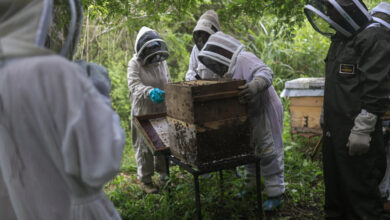International alert for the Candida Auris Fungi. What you should know?
The danger of catching this fungus Candida Auris or C.Auris as doctors call it, is that it can enter through the bloodstream and spread throughout the body, generating massive infections that can lead to a fatal outcome.

María Claudia Londoño D
Listen to this article
Read more content like this at: thewomanpost.com
C.Auris comes from the Latin ear, which is one of the organs that are affected.
Risk factors:
• Being hospitalized with catheters or tubes.
• Being hospitalized in intensive care units.
• Recent surgery.
•Diabetes
• Living in a residence for the elderly.
• Make frequent visits to clinics and hospitals.
• Frequently take antibiotics or antifungals.
• Present diseases frequently.
• Have low defenses.
People who work in medical centers are likely a means of transporting the fungus by handling tables, walkers, items, and machines that walk the corridors daily and are used from patient to patient.
It is important to note that determining the presence of candida auris may be missed by some detection methods and complete reports may not be available. So far, reports of its appearance have been made in Japan, Germany, Pakistan, Canada, Colombia, the United States, the United Kingdom, Kenya, India, Israel, Kuwait, South Africa, Venezuela, South Korea, and the United Kingdom.
Related to women
At some point in life, women likely carry this fungus without having symptoms or manifestations that indicate it, since in the vagina the microorganisms present there are generally kept in balance. But at the time of activation, it can generate vaginal candidiasis, caused by the fungus Candida albicans whose warning signs are:
• Itching and irritation of the vagina and vulva.
• Burning sensation, especially during intercourse or when urinating.
• Redness or swelling of the vulva.
• Vaginal aches and pains.
• Vaginal rash.
• Thick, white, odorless vaginal discharge that looks like cottage cheese.
• Watery vaginal discharge.
Although it is not transmitted through sexual intercourse, some men may develop soreness, irritation, or a rash after coming into contact with a woman with a yeast infection.
These are some aspects that could favor the appearance of yeast infection in women:
• If you are taking prescribed antibiotics for other kinds of infections. Antibiotics change the normal balance between microorganisms in the vagina.
• You are pregnant.
• Has obesity.
• is diabetic.
• If you take medication or are being treated for a disease that affects your immune system.
What measures to take?
If symptoms persist after taking antibiotics formulated for an infection, it is likely due to the presence of candida auris in the body, such as fever and chills that do not improve, or even when treated with antifungals a fungal infection, you notice that it is not getting better, or if you have been in contact with someone infected with C Auris and you develop fever and chills.
The usual laboratory tests are not used to have a definitive result. In this case, you can ask your doctor to order these blood tests.
• CSC with differential.
• Blood cultures.
• Basic metabolic panel.
• B-1,3 glucan test (assesses a specific sugar present in some mushrooms).
How to prevent it?
If you make visits to clinics and hospitals or have been in contact with someone diagnosed with the presence of this fungus, follow the routines of frequent hand washing with plenty of soap and water, if possible surgical soap or alcohol. Follow the instructions regarding the use of gowns and caps that are supplied in the hospital centers.
When the medical or nursing staff attend to the patient or family member you visit, observe if they follow hygiene and prevention habits. If not, feel free to request them.
Maintain healthy and healthy eating habits to ensure that your immune system can deal with the presence of this fungus at some point.
It is important not to confuse symptoms that may seem normal, such as discharge burning or fever. In these cases, it is always better to consult to rule out the presence of fungi in our body that could seriously affect us.




